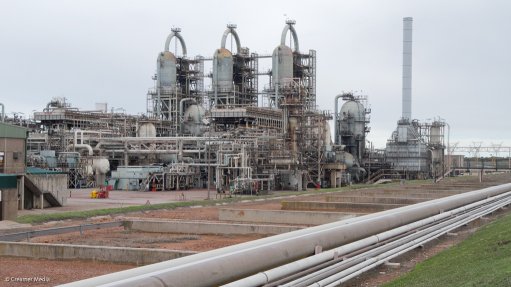
The PetroSA GTL refinery in Mossel Bay
South Africa’s PetroSA aims to make a final investment decision (FID) by April on a project designed to support the resumption of production at the mothballed gas-to-liquids (GTL) refinery in Mossel Bay, following receipt of Cabinet’s backing for its controversial selection of Russia’s GazpromBank Africa as the project’s investment partner.
The endorsement was made at a special meeting held on December 8, where Cabinet received an update on progress regarding the reinstatement of the GTL refinery, which has been in care and maintenance since November 2020, following the failure of the $1-billion Project Ikhwezi to replenish the refinery’s dwindling supply of indigenous offshore gas.
Cabinet was also updated on the process followed by the Central Energy Fund, PetroSA’s State-owned holding company, to secure a partner with the “requisite technical and financial resources” to return the refinery to full operation on a risk- sharing basis.
The selection of GazpromBank Africa arose after PetroSA issued a request for proposals in January last year from potential partners that could offer a turnkey solution, including funding and feedstock security, to refurbish, modify and upgrade the decommissioned facility.
In late November, investigative publication amaBhungane revealed that, while 20 companies submitted bids, the evaluation criteria employed by PetroSA resulted in all but GazpromBank Africa being disqualified. This, despite concerns raised internally about the threat of sanctions, given that the US and the European Union imposed sanctions on Russia after its invasion of Ukraine in early 2022.
Cabinet spokesperson Khumbudzo Ntshavheni dismissed arguments that the partnership could pose a secondary sanctions risk, noting various exemptions in place, while highlighting that several other countries, including Brics bloc countries, had ongoing energy trade activities with Russian companies.
In a separate briefing, PetroSA acting COO Sesakho Magadla reported that an independent legal opinion had been obtained, which concluded the sanctions risk was low, owing to the fact that primary sanctions affected companies and individuals from those countries that had imposed the restrictions, while no secondary sanctions had, to date, been imposed on other countries.
Magadla also suggested that “critical energy security”, along with food and medicines, had been exempted from the sanctions.
“This project falls within that description, because it is also critical for South Africa’s energy security,” she asserted.
The tie-up with a Russian company could, however, have implications for PetroSA’s plans to cooperate with TotalEnergies, of France, on the international energy group’s Brulpadda and Luiperd fields, off the South African coast.
However, PetroSA indicated that progress had slowed primarily because of pricing issues, with first gas only expected after 2030.
“We cannot be sitting idle and waiting for 2030 while our plant is rotting,” Magadla added.
Ntshavheni noted that the partnership with GazpromBank Africa remained dependent on the FID, which would itself be informed by the outcome of a joint bankable business case.
PetroSA is optimistic of reaching a FID with GazpromBank Africa on what has been reported to be a R3.7-billion project during the first quarter of the 2024 calendar year.
The company expects to achieve financial close by the end of the second quarter, after which it expects engineering and construction to be implemented over an 18-month period.
PetroSA acting CEO Sandisiwe Ncemane argued that the reinstatement of the project would support security of fuel supply in the Eastern, Northern and Western Cape provinces in a context of declining domestic refining capacity.
The company also argued that reinstating the GTL refinery as soon as possible would help prevent the asset, which it values at $2.85-billion, from further decay.
However, it acknowledged that significant investment would be required to restart production, owing to the fact that some equipment was either obsolete or in poor condition.